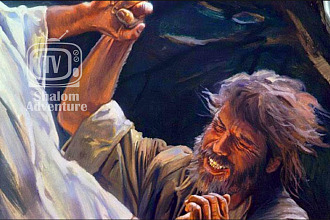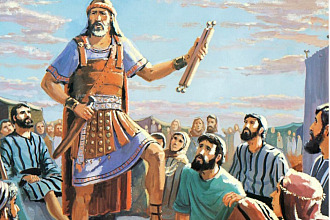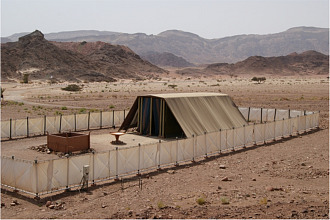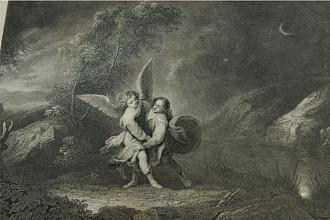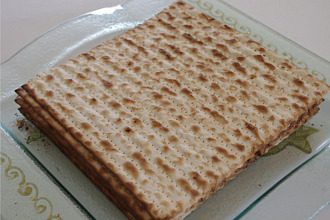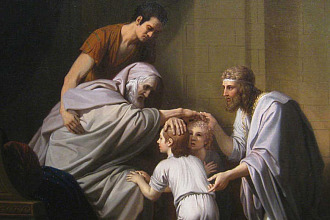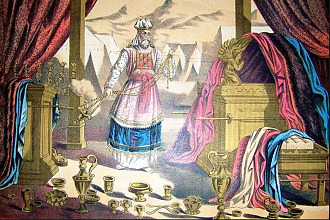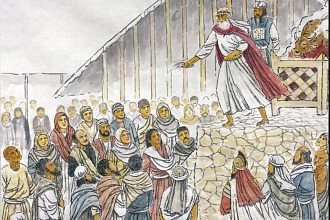Parasha for the Week: Beshalach: Exodus 13:17 – 17:16
Haftarah for the Week: Judges 4:4 – 5:31
Apostolic Writings: Romans 3:9 - 31
Overview
Pharaoh finally sends Bnei Yisrael out of Egypt. Pillars of cloud and fire lead them toward Eretz Yisrael on a circuitous route, avoiding the Pelishtim (Philistines). Pharaoh regrets the loss of so many slaves and chases the Jews with his army. The Jews are very afraid as the Egyptians draw close, but G-d protects them.
Moshe raises his staff and G-d splits the sea, enabling the Jews to cross safely. Pharaoh, his heart hardened, commands his army to pursue, whereupon the waters crash down upon the Egyptian army.
Moshe and Miriam lead the men and women, respectively, in a song of thanks. After three days' travel only to find bitter waters at Marah, the people complain. Moshe miraculously produces potable water. In Marah they receive certain mitzvot. The people complain that they ate better food in Egypt. G-d sends quail for meat and provides manna, a miraculous bread that falls from the sky every day except Shabbat. On Friday a double portion descends to supply the Shabbat needs. No one is able to obtain more than his daily portion, but manna collected on Friday suffices for two days so the Jews can rest on Shabbat. Some manna is set aside as a memorial for future generations. When the Jews again complain about a lack of water, Moshe miraculously produces water from a rock. Then Amalek attacks. Joshua leads the Jews in battle while Moshe prays for their welfare.
"Shabbat Shirah"
Parashat Beshallach is read on Shabbat Shirah (Shabbat of Song). This name was given to this Shabbat because in this Torah portion we read the story of the splitting of the Red Sea and the song (Shir) that Moshe and the people of Yisrael sang, praising Hashem for the great miracle they had just witnessed. In Exodus 15:20 it is written: “Myriam the prophetess, Aharon’s sister, took a tambourine in her hand, and all the women went out after her, with tambourines and with dancing.” That is why the Jewish tradition says the men and women sang separately. Moshe led the men while Myriam led the women. The Torah also tells us the women, in addition to singing, played their tambourines and rejoiced with dancing. According to the Sages, the women had such great faith Hashem would liberate the Jewish people, that before the Exodus they prepared the tambourines for this occasion.
"On the Way"
After describing the redemption of Israel from slavery and the feast celebrating this freedom, Pesach, the Scripture starts the narrative of the people of Israel in the wilderness. They are at the beginning of their path to the fulfillment of their destiny as G-d’s people.
They were still weak, not knowing how G-d can release them forever from the ambition and power of Pharaoh. They still lack of trust in G-d, the only quality that can give a person determination and courage, power and enthusiasm, no matter what the task and under any circumstances, since he knows that all in His hands, but they are trusting G-d's instrument, Moses.
"HaShem’s Presence"
Hashem's presence accompanied the Yisraelites during the Exodus, as it is written: “HASHEM went before them in a pillar of cloud by day to lead the way, and in a pillar of fire by night to give them light. So they could travel both day and night. The pillar of cloud by day and the pillar of fire by night never departed from the people” (Exodus 13:21-22).
So far in the Hebrew text of the Exodus narration, the name used to refer to God has been Elohim, a name reminding Yisrael that Hashem is in charge of them. Now, for the first time in the Exodus narration, the name yhwh is used, reminding the people that Hashem is the closest friend and guide of Yisrael. Hashem is now in front of His people, guiding His people, providing light for His people, giving shade from the desert heat in the daytime and warmth from the desert chill at night. The use of the name yhwh denotes the extraordinary ways of Hashem’s providence; and how these miracles recur, just like the extraordinary wonders He performed for Yisrael in Egypt. The name yhwh always denotes the God who is very close to human beings, the God who wants to guide us, who wants to save us, who wants to be our friend.
Rabbi Leff says, “We stand today on the brink of redemption and are being tested to see if we merit God’s redemption. We can safely leave bringing Mashiach to God, but we must merit his coming” (Ibid.). Only by intensifying our commitment to Torah and the Bible, by dedicating ourselves to serving Hashem in all areas of life, by removing the chametz (leaven/sin) from our hearts, will we successfully discharge our three days in the desert.
Haftarah: Judges 4:4 – 5:31
We have a very negative view of the people of Israel in the time of the Judges, but reading this book it is “essential to remember that combined years of peace and faithfulness far outnumbered the years of failure. Always, the Judge was chosen by God, and whenever he or she called upon the people to repent, they responded.”
The text of the Haftarah is about Deborah, name which means “bee.” “At that time Deborah, a prophetess, wife of Lappidoth, was judging Israel..” (Judges. 4:4). There is a question here about the translation of this verse, If Radak translates the expression as it is here “wife of Lappidoth” saying that “Lappidoth was in fact Barak, the army commander, Barak and Lappidoth mean "flashes of lightning," and are therefore used interchangeably” (Rubin commentary, 137). However, some other Jewish commentators as Ralbag and Metzudoth, do not translate that she was the “wife of Lappidoth” but a “fiery woman” saying that the word Lapid means “torch” implying that Deborah was energetic and decisive. Rashi, based on the Midrash, translates “a woman who made wicks for use in the Tabernacle”
The name Barak means “thunderbolt”, which suggest that he is summoned by the Lord’s “flashing sword.” And it is interesting to notice that his name is among the heroes of faith in Hebrews 11:32.
Deborah was the first Judge to be described as a prophetess and the first of whom it is said that she decided cases of law for the nation. She was chosen at a special time to lead and end war with the Canaanites and their domination. There was another prophetess before Deborah, Myriam, but she was not Judge in Israel.
Another parallel between Myriam and Deborah is the songs they sang: “Sing to the Hashem, for he has triumphed gloriously; horse and rider he has thrown into the sea.” (Exodus 15:21). God uses men and women to reveal his will to humanity. When God choose women for ministries, who are we to refuse these choices?
Exactly as Miriam was a great support for Moses, Deborah supported Barak, who could be according some commentators her husband and in the same time the chef of Israel’s army: “Then Deborah said to Barak, “Arise! For this is the day in which Hashem will deliver Sisera into your hand. Has Hashem not gone out before you?” So Barak came down from Mount Tabor with 10,000 men following him. Hashem threw Sisera and all his chariots and all his army into confusion before Barak with the edge of the sword. Then Sisera got down from his chariot and fled away on foot.” (Judges 4:14–15). Let’s remember that the people of Israel were not very well organized, Israel remained incapable of united action until a woman (Deborah) summoned them to the Lord’s battle, Israel had no standing army at that time. The fighters were all non-professional volunteers. These volunteers were not full of courage to rise up and face the enemy, the glory of victory went to a woman (Jael).
The chapter 5 is a song sung by Deborah who was also a poetess. Webb affirms “The Hebrew used in this song shows it to be on of the most ancient pieces of poetry” in the Tanach.
APOSTOLIC WRITINGS: Romans 3:9 - 31
We very often, have a wrong worldview of the Tanach and the God of Israel, which, by the way, is the same God as the God of the Apostolic Writings or New Testament. Jews and Christians worship the same God. This wrong worldview is that God’s love, promises, and prophecies in the Apostolic Writings are conditional. It is said, or believed: “To deserve His blessings we must be obedient” this is especially true when we debate about Eretz Yisrael (the Land of Israel) and the rights of the people of Israel to stay in that land. God has permitted Israel’s exile, because Israel has not been faithful to God, and thus, the modern return of Israel to their home land cannot be the fulfillment of any prophecy, because Israel is still disobedient, especially that Israel still don’t accept Yeshua as their Messiah. We would like, here, to challenge this worldview and wrong understanding of the Tanach.
It is appropriate to think about this as we reflect on the Exodus. A midrashic discussion among the angels tells us that this discussion is not new, and certainly not only a Christian discussion, it is said: The Torah affirms, “The children of Israel went on dry land in the midst of the sea.” (Exodus 14:29) and the Midrash says, “The heavenly angels marveled and said: ‘How can people who are idol worshipers walk on dry land in the midst of the sea?’” (Exodus Rabba 26:4). In other words, the Israelites, clearly, were not deserving of such a great miracle as the splitting of the sea, and walking on dry land; the moral difference between them and the Egyptians was not sufficiently marked to justify saving ones while drowning the others. Performing miracles for the undeserving is, according to Christian traditional view, discriminatory and presents even God with moral difficulties.
The first reflection on this topic and objection to God’s miracles in favor of His people, is to ask: who in this world deserves anything from God? Paul answers this question, reminding that “For we have already charged that all, both Jews and Greeks, are under sin, as it is written: ‘None is righteous, no, not one; no one understands; no one seeks for God. All have turned aside; together they have become worthless; no one does good, not even one.’” (Romans 3:9–12), and this truth that no one deserves anything, because all are sinners, is not a new truth revealed by the Apostolic Writings, but a truth already taught in the Hebrew Bible. Rabbi Shaul’s text is a direct quotation of Psalms 14 and 53, in this last Psalm it is said: “They have all fallen away; together they have become corrupt; there is none who does good, not even one.” (Psalms 53:3). Thus no one deserves anything in this world, not you and not me.
However, if it is clear that Israel do not deserve anything, the Bible says that the great difference between Israel and the Egyptians is their faith. The people of Israel have no more merits than any other people, all of them are sinners and need Mashiach to be saved, but Israel demonstrated their faith by the passover blood on the doors of their houses, they demonstrated their faith by leaving Egypt in the middle of the night without knowing where they were going. Rabbi Shaul confirms God’s love for each one of us saying: “But because of his great love for us, God, who is rich in mercy, made us alive with Mashiach even when we were dead in transgressions — it is by grace you have been saved. . . . For it is by grace you have been saved, through faith and this not from yourselves, it is the gift of God not by works, so that no one can boast (Ephesians 2:4-9). “God is love”, it is an affirmation of the Bible and the exodus is a great illustration of this love of God for us and for everyone on the earth. He is full of mercy. His forgiveness is always available to us. Available—but not automatic—because forgiveness and salvation are reserved to everyone who has faith in God, in his love and in his Mashiach. The blood of the lamb put on the doors by the Israelites was a symbolic act of their faith in the blood of the Messiah, “For it is by grace we have been saved, through faith.” Nobody can boast and says that he is righteous enough by himself to be saved. “For by works of the law no human being will be justified in his sight, since through the law comes knowledge of sin.” (Romans 3:20)
Thus, we affirm that the promises God has made to his people are not conditional, and not proportional to their faithfulness to the law of God, since no one is justified by the work of the law. We are all depending on our faith and our own choice. We always have to make choice in our life, and our choice can be led by our knowledge of God’s will, or by our selfish desires, but God’s promises are always here and always available for us.
The teaching of Rabbi Shaul on the subject of righteousness is: “But now the righteousness of God has been manifested apart from the law, although the Law and the Prophets bear witness to it— the righteousness of God through faith in Yeshua HaMashiach for all who believe. For there is no distinction: for all have sinned and fall short of the glory of God, and are justified by his grace as a gift, through the redemption that is in Mashiach Yeshua” (21–24). Maybe it is difficult to understand this concept when we have been raised that getting a reward, we need to deserve it. All our societies have been built on this pattern: reward/punishment, if you do good you deserve a reward, on the opposite if you do evil, you deserve a punishment. However, Rabbi Shaul explains how God is rewarding us: “They are set right as a gift of His grace, through the redemption that is in Messiah Yeshua. God set forth Yeshua as an atonement, through faith in His blood, to show His righteousness in passing over sins already committed.” (24–25). Yeshua is the key person in the process of Salvation of everyone who accept (faith in) his sacrifice for him. The text continues: “Through God’s forbearance, He demonstrates His righteousness at the present time—that He Himself is just and also the justifier of the one who puts his trust in Yeshua.” (26). It is through his patience, and his own righteousness that God justify anyone who put his faith in Yeshua, the Mashiach. That is why we cannot boast for what we are or what we are doing, that is why the Rabbi asks a question: “Where, then, is boasting? It is excluded. By what principle? Of works? No, but by the principle of faith.” (27), it is definitely not by our “work,” our observance of the Mitsvoth that we could be justified. And in this matter there is no difference between Jews and non-Jews. Everyone, Jew and not Jew can be justify in the same way, through the merit of the Messiah. “For we consider a person to be set right apart from Torah observance. Is God the God of the Jewish people only? Is He not also the God of the Gentiles? Yes, of the Gentiles also.” (28–29). Then the next question, is then, why did we receive the Torah and the Mitsvoth? If we receive salvation only through faith in Yeshua, it is not necessary anymore to keep the law. Some go so far in this direction that they affirm that through Yeshua the Torah and all its mitsvoth are nullified, canceled, we don’t need them anymore. That is not the truth of the whole Bible. The Apostolic Writings are in harmony with the Torah and the Tanach, they would never cancel what God has already said, that is why, answering this question Paul affirms: “Since God is One, He will set right the circumcised by faith and the uncircumcised through faith. Do we then nullify the Torah through faithfulness? May it never be! On the contrary, we uphold the Torah.” (30–31). As disciple of Yeshua, we uphold the Torah and its prescriptions.



